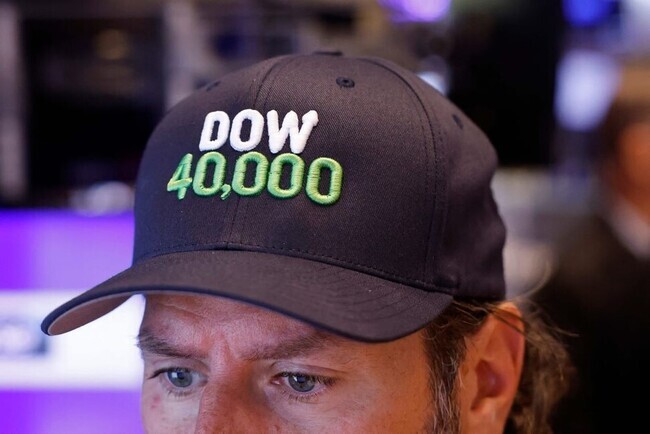hankyoreh
Links to other country sites 다른 나라 사이트 링크
Global stock markets are rallying to new highs — so why isn’t Korea’s?

“The Korean stock market just seems hopeless.” It’s a common complaint among small-time investors in the KOSPI and the KOSDAQ, Korea’s leading stock indices.
Despite a government stimulus package, Korean stock prices remain depressed as numerous investors set their sights on overseas stocks, including those in the US. That’s prompting fears about an erosion of the Korean capital market.
In fact, there are clear indications that Korean equities aren’t in the same ballpark as the global equity market. Korea’s benchmark KOSPI index fell 0.65% on Tuesday to 2,724.18 at the end of trading. The KOSPI is up 2.6% from the end of 2023 (2,655.28), while the KOSDAQ has actually fallen by 2.3%.
This is a stark contrast to the situation overseas. Strong corporate performance and expectations about lower interest rates have breathed new life into equities, pushing markets to new heights.
On the New York Stock Exchange, for example, the Nasdaq index closed the day Monday at 16,794.87 for an all-time high at the close. The Dow Jones Industrial Average has also been roaring ahead, reaching the 40,000 milestone for the first time on May 17.
Japan’s Nikkei 225 has risen 16.4% this year as of Tuesday.
Trends such as these are motivating retail investors to turn their backs on the Korean stock market.
According to statistics from the Korea Exchange and the Korea Securities Depository, retail investors have sold off 9.69 trillion won worth of stock on the KOSPI and the KOSDAQ this year as of Monday. In the same period, domestic investors had bought up US$5.74 billion in foreign stocks.
In a blog on individual investors’ investments in foreign stocks released in March, the Bank of Korea assessed that “the proportion (based on balance) that individuals make up in private sector foreign stock investments rose from 7.3% at the end of 2019 to 20% by the end of 2023, putting individuals on par with institutional investors as agents of investment.”
The CEO of an asset management company described the Korean market as “malformed.”
“Unlike in the US and elsewhere, investors are hard-pressed to find rapidly growing companies on the Korean stock market, and the volatile subprime stocks are actually being overvalued,” they said.
A bureaucrat at an economic agency well-versed in international finance markets told the Hankyoreh: “If investor flight speeds up, companies will follow suit and head to stock markets like the US ones where it’s easier to raise capital, rapidly deteriorating the base of the local market.”
By Park Jong-o, staff reporter
Please direct questions or comments to [english@hani.co.kr]

Editorial・opinion
![[Editorial] Seoul failed to use diplomacy with Moscow — now it’s resorting to threats [Editorial] Seoul failed to use diplomacy with Moscow — now it’s resorting to threats](https://flexible.img.hani.co.kr/flexible/normal/500/300/imgdb/original/2024/0624/8217192182656295.jpg) [Editorial] Seoul failed to use diplomacy with Moscow — now it’s resorting to threats
[Editorial] Seoul failed to use diplomacy with Moscow — now it’s resorting to threats![[Column] Balloons, drones, wiretapping… Yongsan’s got it all! [Column] Balloons, drones, wiretapping… Yongsan’s got it all!](https://flexible.img.hani.co.kr/flexible/normal/500/300/imgdb/original/2024/0623/9117191084517636.jpg) [Column] Balloons, drones, wiretapping… Yongsan’s got it all!
[Column] Balloons, drones, wiretapping… Yongsan’s got it all!- [Editorial] It’s time for us all to rethink our approach to North Korea
- [Column] Why empty gestures matter more than ever
- [Editorial] Seoul’s part in N. Korea, Russia upgrading ties to a ‘strategic partnership’
- [Column] The tragedy of Korea’s perpetually self-sabotaging diplomacy with Japan
- [Column] Moon Jae-in’s defense doublethink
- [Column] S. Korea-China cooperation still has a long way to go
- [Editorial] Seoul must use tact and diplomacy to check deepening Russia-NK ties
- [Editorial] Thorough audit, evaluation of oil test drilling are needed
Most viewed articles
- 1[Editorial] Seoul failed to use diplomacy with Moscow — now it’s resorting to threats
- 2Enough trash-slinging — it’s time to pursue ‘strategic communication’
- 3Is Korea ready to protect the rights of Filipino domestic workers arriving this fall?
- 4[Column] Balloons, drones, wiretapping… Yongsan’s got it all!
- 5Han says he’ll seek special counsel bill on Marine’s death if elected PPP chief
- 6After Putin’s Pyongyang summit, Seoul and Moscow play dangerous game
- 7US nuclear-powered carrier arrives in Busan for drills with South Korea, Japan
- 8Russia might provide military tech assistance to N. Korea if S. Korea crosses red lines, says expert
- 9[Editorial] It’s time for us all to rethink our approach to North Korea
- 10North Korea, Russia deal blow to US-led order – how will Washington respond?